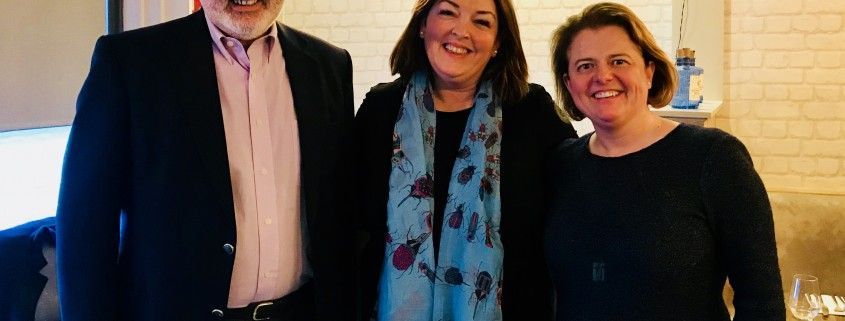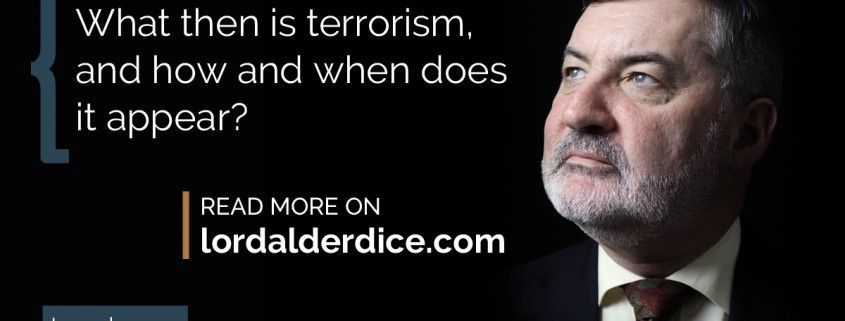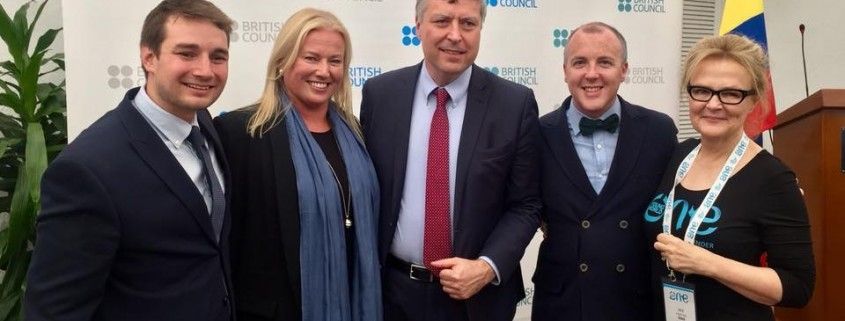Tina McKenzie appointed to the CDPB Board of Directors
We are absolutely delighted to announce the appointment of Tina McKenzie to the CDPB Board of Directors.
Welcoming the appointment, CDPB Chairman Lord Alderdice said: “Tina McKenzie is an extraordinary individual, who has already been a huge success in business, but has never lost her heart for the community and her wish to make a contribution to making things better for the next generation. Tina has already given enormous help and support to CDPB as a Special Advisor and it will be a pleasure and a privilege to work with her in this new and expanded role.”
Tina McKenzie is an award-winning Managing Director with over 20 years’ experience in the Recruitment and Employment Services sector within Northern Ireland, GB and international markets. Her experience spans a variety of business verticals including professional services, agri-food and logistics. Having worked internationally providing HR and recruitment consultancy for the world’s largest companies, Tina’s key expertise is in building global employment investment strategies and best people practices.
She returned to her native Northern Ireland in 2013 and today leads all Staffline Group companies in Ireland, including Northern Ireland’s largest recruitment company Diamond Recruitment and leading employment support and justice services provider PeoplePlus NI. Under Tina’s direction Staffline Group in Ireland has grown from a standing start to a turnover of over £60m in less than three years, earning the company UTV/Business Eye’s award for Fast Growth Business of the Year in 2015. This tremendous success also led to Tina securing the Outstanding Leadership & Management Award from Women in Business that same year.
A graduate from Ulster University in Coleraine, Tina is a member of several professional groups including the Chief Executives’ Club at Queen’s University, Women in Business NI, Confederation of British Industry, and the Institute of Directors.
She is currently the NI Director for the Recruitment and Employment Confederation, the governing body of the recruitment industry. Tina is a recognised voice for building a new and prosperous Northern Ireland for all and is passionate about helping people gain skills while creating more local opportunities for economic growth.
In 2017 Tina has been appointed as the Honorary Consul for Finland in Northern Ireland.
CDPB to mark the 20th anniversary of the Belfast/Good Friday Agreement in 2018
British Council in association with the Centre for Democracy and Peace Building will host a conference to mark the 20th anniversary of the Belfast/Good Friday Agreement in April 2018. It will convene policy makers and peace practitioners from around the world to share reflections and case studies on building effective, inclusive and sustainable peace.
The series of plenary sessions, workshops, site visits and cultural events will create an open, inclusive and safe space for international dialogue to reflect upon the experience of the peace processes across the globe. The events will build on the Northern Ireland experience of and expertise in conflict resolution and peacebuilding. By marking the achievement of the multi-track work that led to the signing of the Agreement, the conference will provide opportunities for international dialogue to reflect on the experience of everyday peacebuilding.
The conference will also reflect on the contribution of partners such as the EU and the USA, as well as the role of Ireland and citizens across the island of Ireland in the achievement and continuation of peace.
The British Council will draw on its global network to bring practitioners, academics and policy makers to Northern Ireland to share lessons learnt from the different approaches in South Africa, Lebanon, Colombia and the Western Balkans. Bringing together political leaders, academics and community activists from around the world, we aim to engage a global audience in this vital dialogue, inspire innovative thinking and practice, and activate a new generation of peacebuilders globally.
Peace and Beyond is organised by the British Council in partnership with Queen’s University Belfast and Ulster University, in association with the Centre for Democracy and Peace Building.
Further info on https://www.britishcouncil.org/peace-and-beyond
Lord Alderdice on Fundamentalism, Radicalization and Terrorism
Fundamentalism, Radicalization and Terrorism. Part 1: terrorism as dissolution in a complex systems
In the first of two papers, Lord Alderdice draws on his personal experience of living and working in Northern Ireland and other countries that have suffered from terrorism, and describes from a psychoanalytic and systemic perspective the history of national, cultural and political conflicts which form the backdrop to the struggles against fundamentalism, radicalization and terrorism in current times. By examining and understanding the group dynamics and collective experiences of minority populations that have suffered generations of subjugation, humiliation and injustice at the hands of others, Lord Alderdice demonstrates how terrorism is not an individual but a group phenomenon and that any successful intervention aimed at reducing fundamentalism, radicalization and terrorism needs to identify and take into account the complex relational processes and experiences in all parties involved in the current global conflict.
Read more here: http://www.tandfonline.com/eprint/ErV56EkqdDk4Dxz6qgSJ/full
Fundamentalism, Radicalization and Terrorism. Part 2: fundamentalism, regression and repair
Prior to the watershed events of 11 September 2001, terrorism was generally seen simply as politically motivated, criminal violence. Since then the phenomena of religious fundamentalism, political radicalization and terrorism have become fused in the public mind, partly under the influence of the political and military reaction described as the ‘War on Terror’ and its successors. While there is clearly an important overlap in the religious thinking of some fundamentalists, the radical agenda of political Islamist groups and the violent activities of those who currently use the tactics of terrorism, these are not identical phenomena, and treating everyone who falls into one of these groups as the same as all the others has exacerbated rather than improved global security. In the second of two papers based on his work with terrorist organizations and areas of the world embroiled in entrenched conflict, Lord Alderdice develops a different approach informed by psychoanalytical principles and systems and complexity theories to clarify some of the boundaries and overlapping elements of these three phenomena. This approach not only provides a more evidence-based analysis, but also permits a more reflective and constructive response to these clear and present dangers.
Read more here: http://www.tandfonline.com/eprint/xuzAzxF76PDNaZcVACui/full
CDPB to participate in the World Science Forum 2017
Thanks to the invitation from the Global Thinkers Forum, the Centre for Democracy and Peace Building is delighted to partner with the WANA Institute and host the session at the World Science Forum in Jordan.
World Science Forum 2O17 theme is Science for Peace. It will engage the world of science and redefine the global potential of scientific communities and policymakers to bring real change to our interlinked societies.
CDPB is delighted to co-curate and participate in the Emerging Concerns in Managing Radicalisation among Youth session.
Current geo-political challenges in the Middle East impact how researchers and policy makers can manage radicalisation among youth. New forms of extremism are likely to re-emerge despite the military defeat of Daesh, particularly that the political and socio-economic structures and ideologies that contributed to the phenomenon remain intact in the region. Recent developments in Europe also point to an increase in radical lone wolves compared to earlier threats of organised armed groups. These challenges raise important question into best approaches to manage radicalisation as a spiritual-ideological quest, and as a response to structural frustrations.
This session draws on multi-disciplinary research in Europe and the Middle East with insight from field research with fighters and returnees to addresses crucial questions like:
• How does the spiritual factor enhance or undermine CVE efforts? How the spiritual interacts with the structural in understanding radicalisation and necessary CVE efforts?
• How can policy makers and CVE stakeholders introduce behavioural and ideological transformations that can delegitimise extremist ideologies?
• What are the prospects and challenges for reintegrating returnees in local communities with the current legal and communal infrastructure?
• How can current knowledge and practices on CVE be revised and re-designed for efficient preventive CVE measures?
Dr Dalia Ghanem-Yazbeck, El Erian Fellow, The Carnegie Middle East Center (CMEC), Beirut, will moderate the panel discussion.
Speakers:
Dr Neven Bondokji, West Asia North Africa Institute
Eva Grosman, Centre for Democracy and Peace Building
Professor Mike Hardy, Centre for Trust, Peace and Social Relations, Coventry University
Amin Nehme, Lebanese Development Network
The session will take place on Friday, November 10 at 11.30am.
Conor Houston to address the One Young World in Bogota
Conor Houston, Consultant with the Centre for Democracy and Peace Building will address the One Young World global youth summit taking place from 3 to 7 October in Bogota, Colombia.
The One Young World 2017 will bring together over 2000 young leaders from 190 countries around the world as well as international figures including Kofi Annan, Sir Bob Geldof and President Santos of Colombia.
Conor will speak as part of the ‘Peace & Reconciliation’ session and also deliver a workshop with Belfast entrepreneur Peter Edgar on ‘How to drive change: a lesson from Northern Ireland’.
The two young leaders will be appointed ‘One Young World Ambassadors’ at the event and are being supported by the Centre for Democracy and Peace Building and the British Council.
Peter Edgar said: “We are excited about the opportunity to tell the story of growing up in post-conflict Northern Ireland and will explore our work in setting up the Young Influencer network and other groups in connecting young people who are committed to Northern Ireland realising its potential through social and economic innovation.”
Conor will also launch his ‘Connected Citizens’ initiative at One Young World which seeks to connect world’s most passionate, dynamic and innovative citizens to inspire them to build a more peaceful, compassionate and resilient world.
Speaking ahead of the summit Conor said “our message is one of hope – to share the experience of Northern Ireland which is emerging from conflict towards peace. The challenge now is to ensure that everyone has the ability to benefit from the opportunities of peace.” He continued: “my generation has the responsibility to be the bridge-builders between peace and prosperity. I am proud to represent Northern Ireland on the global stage, proving we are able to lead and inspire the world.”
CDPB are launching the next phase of their EU Debate NI programme ‘Navigating Brexit: A Roundtable Series’.
Over the next 6 months, EU Debate NI will host 5 Roundtable events which will provide a space for informed discussion focused on developing flexible and imaginative solutions for Northern Ireland post-Brexit.
These Roundtable events will involve key stakeholders from across the private, public and community sectors to encourage a solutions-orientated approach, informed by leading academic expertise.
These thematic events will focus on how we navigate the Brexit process, solutions for the post-Brexit UK-EU relationship and policy priorities in the context of devolution.
The Roundtable events will include:
• Trade: retaining and enhancing the competitiveness of NI businesses
• Ensuring co-operation and strategic partnerships on the environment and agri-food sectors
• Ensuring co-operation and strategic partnerships on the environment and energy sectors”
• Maintaining the Common Travel Area, citizenship & rights
• Building our knowledge economy: the Higher Education solution
Key Observers, including representatives on the NI Civil Service, UK Government and other relevant decision-makers will be invited to all events.
The launch ‘Navigating Brexit: A Roundtable Series’ will take place at the Ulster Bank Entrepreneurial Spark in Belfast, 8-9.30am on Thursday 7th September 2017.
This event will outline the Roundtable programme and include a briefing from Professor David Phinnemore on the current status of the Brexit negotiations.
‘Navigating Brexit: A Roundtable Series’ is supported by Diamond Recruitment.
To attend the launch on 7 September please register via: https://getinvited.to/cdpb/brexit/






